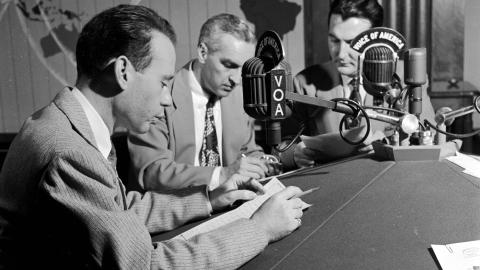Mention the Voice of America or Radio Free Europe/Radio Liberty to most Americans, and they will give you a blank look. Or they’ll say, “Hmmm, wasn’t that a Cold War thing?” It was indeed a Cold War thing but much more. Today these two services have grown to five, collectively referred to as the US Agency for Global Media, which use every existing platform—including radio where needed—to connect with a global audience of nearly half a billion people.
Unlike the BBC World Service, these services were not built on a pre-existing domestic one, so their names have never been household words. This low profile, so painfully different from that of the BBC, can be frustrating for the Americans who staff the agency. But it amuses Mark Pomar, an American scholar of Russia who between 1982 and 1986 was assistant director of Radio Liberty (the Russian service of RFE/RL) and director of VOA’s USSR division.

















